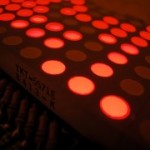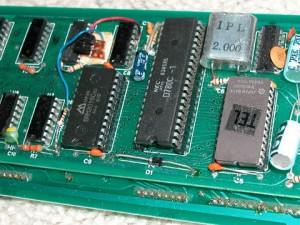 The Tenica P101 is a scrolling LED marquee marketed in the early 90’s. It consists of a Z80 microcontroller running a massive bank of multiplexers to control a 95×7 LED array made up of nineteen 5×7 LED “tiles”. It is capable of displaying a-z, A-Z, 0-9, and various special characters. A series of character lines are programmed in by the user and are then displayed in a loop. The style of animation for each line and the transition between lines is programmable by the user.
The Tenica P101 is a scrolling LED marquee marketed in the early 90’s. It consists of a Z80 microcontroller running a massive bank of multiplexers to control a 95×7 LED array made up of nineteen 5×7 LED “tiles”. It is capable of displaying a-z, A-Z, 0-9, and various special characters. A series of character lines are programmed in by the user and are then displayed in a loop. The style of animation for each line and the transition between lines is programmable by the user.
I found a couple of these units in storage and pulled them out to see if I could get them to function. One started up and displayed “CONTENTS LOST”, but after programming some lines into it the device seemed to be working properly. After being shut off and turned back on, it would again display the error message. I figured it must be using volatile memory and the onboard battery has gone dead (remember, these things are over 20 years old by now!). The backup battery turned out to be a pack of four 1.2V NiCad batteries. I replaced them in an attempt to fix the memory loss problem, but this didn’t work.
While tracing the power circuit to find another solution, I noticed that the PROM next to the microcontroller looked an awful lot like the ones used in the GM fuel-injection engine computers I’m familiar with. This certainly wouldn’t help me with the memory problem, but I figured I could make some use of the display for some other project if I could figure out how it works. Sure enough, my Moates.net PROM reader/writer was able to extract the program data from the PROM. I successfully disassembled the binary PROM data using one of the Z80 disassemblers available online (see the links below) and began a project to comment and understand the code. So far I have determined the storage format for characters as well as the startup routine and some of the display routine. If you would like to see the current state of the disassembly, visit my code repository on Bitbucket.
There are a few Z80 dissassemblers available including Z80 Simulator IDE (Commercial), and dZ80 (Freeware).
